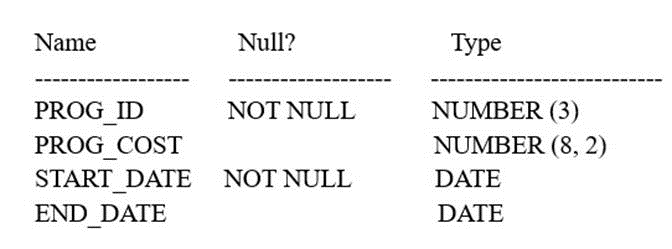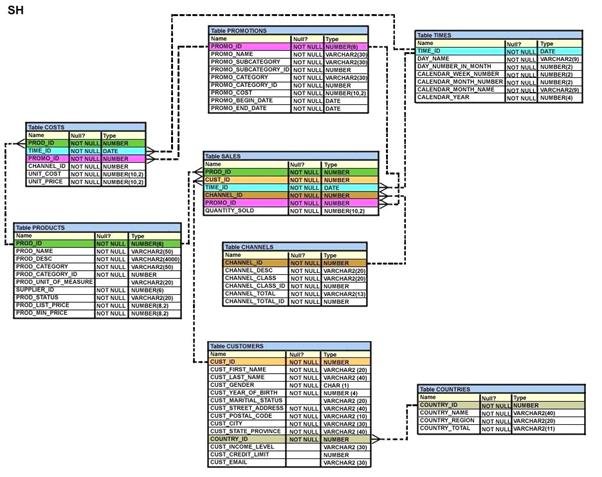Question: 1
You execute the SQL statement:
SQL> CREATE TABLE citizens
(citizen_id CHAR (10) PRIMARY KEY,
last_name VARCHAR2 (50) NOT NULL,
first_name VARCHAR2 (50),
address VARCHAR2 (100),
city VARCHAR2 (30) DEFAULT 'SEATTLE' NOT NULL,
CONSTRAINT cnames CHECK (first_name<>last_name) );
What is the outcome?
Question: 2
Evaluate the following CRTEATE TABLE commands:
CREATE_TABLE orders
(ord_no NUMBER (2) CONSTRAINT ord_pk PRIMARY KEY,
ord_date DATE,
cust_id NUMBER (4) );
CREATE TABLE ord_items
(ord _no NUMBER (2),
item_no NUMBER(3),
qty NUMBER (3) CHECK (qty BETWEEEN 100 AND 200),
expiry_date date CHECK (expiry_date> SYSDATE),
CONSTRAINT it_pk PRIMARY KEY (ord_no, item_no),
CONSTARAINT ord_fk FOREIGN KEY (ord_no) REFERENCES orders (ord_no) );
Why would the ORD_ITEMS table not get created?
Question: 3
Examine the structure of the PROGRAMS table:

Which two SQL statements would execute successfully?
Question: 4
Examine these SQL statements that are executed in the given order:
CREATE TABLE emp
(emp_no NUMBER (2) CONSTRAINT emp_emp_no_pk PRIMARY KEY,
ename VARCHAR 2 (15),
salary NUMBER (8, 2),
mgr_no NUMBER(2) CONSTRAINT emp_mgr_fk REFERENCES emp (emp_no));
ALTER TABLE emp
DISABLE CONSTRAINT emp_emp_no_pk CASCADE;
ALTER TABLE emp
ENABLE CONSTRAINT emp_emp_no_pk;
What will be the status of the foreign key EMP_MGR_FK?
Question: 5
View the Exhibit and examine, the description for the SALES and CHANNELS tables. (Choose the best answer.)

You issued this SQL statement:
INSERT INTO SALES VALUES (23, 2300, SYSDATE,
(SELECT CAHNNEL_ID
FROM CHANNELS
WHERE CHANNEL_DESC='DIRECT SALES'), 12, 1, 500);
Which statement is true regarding the result?